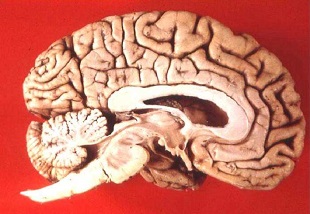 WIKIMEDIA, LOUISIANA STATE UNIVERSITY HEALTH SCIENCES CENTER, JOHN A. BEALHumans may have traded brute strength for brain power, according to a paper published this week (May 27) in PLOS Biology. A team led by Phillipp Khaitovich, an evolutionary biologist at the Chinese Academy of Sciences’ Key Laboratory of Computational Biology in Shanghai, China, studied the metabolomes of five tissues—three from the brain, plus kidney and thigh muscle—in four animals—humans, chimps, rhesus monkeys, and mice.
WIKIMEDIA, LOUISIANA STATE UNIVERSITY HEALTH SCIENCES CENTER, JOHN A. BEALHumans may have traded brute strength for brain power, according to a paper published this week (May 27) in PLOS Biology. A team led by Phillipp Khaitovich, an evolutionary biologist at the Chinese Academy of Sciences’ Key Laboratory of Computational Biology in Shanghai, China, studied the metabolomes of five tissues—three from the brain, plus kidney and thigh muscle—in four animals—humans, chimps, rhesus monkeys, and mice.
The team recorded 10,000 different metabolites in each kind of tissue. They found that the metabolome profile for the human prefrontal cortex was strikingly different from those of other primates, and appeared to have evolved four times as fast as that of chimpanzees in the 6 million years since the two lineages split. The metabolome profile of human muscle had evolved more than eight times as fast as that of chimps in that same time.
The researchers then conducted strength tests of humans and the primates. “According to our results, an average adult chimpanzee is approximately two to three times stronger than an average adult human,” Khaitovich told Live Science. The researchers concluded that humans likely gave up muscle strength in order to route more ...



















